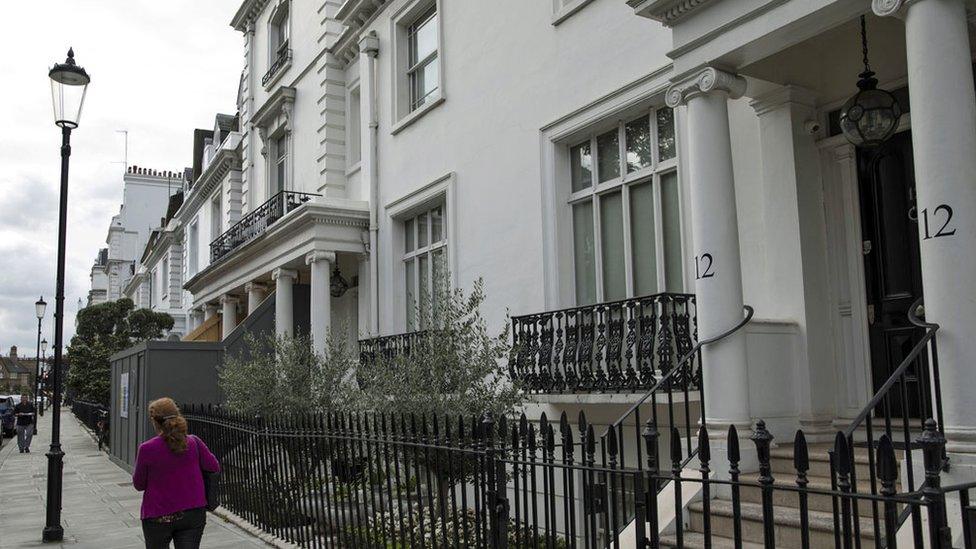Woman in £16m Harrods spend loses wealth seizure challenge
- Published

A woman who blew £16m of unexplained wealth in Harrods has lost her appeal against a National Crime Agency bid to seize her luxury London home.
The Court of Appeal has rejected Zamira Hajiyeva's attempt to stop the UK's first ever Unexplained Wealth Order from being implemented against her.
Mrs Hajiyeva must reveal how she became wealthy enough to buy a mansion near Harrods and a golf course in Berkshire.
She faces losing the properties if she can't provide proof of income.
Mrs Hajiyeva's husband is a state banker jailed for fraud in their native Azerbaijan.
The couple deny all wrongdoing - and Mrs Hajiyeva has not been charged with a crime in the UK.
Dismissing the appeal on Wednesday, Lord Justice Burnett, the Lord Chief Justice, also refused to allow Mrs Hajiyeva to take the case to the Supreme Court - and ordered her to pay the National Crime Agency's (NCA) legal costs.
In the judgement, Lord Justice Burnett and two other senior judges said that Mrs Hajiyeva had been lawfully targeted by the first ever Unexplained Wealth Order (UWO) two years ago.
"The relevant requirement for making a UWO [is that] the court must be satisfied that there are reasonable grounds for suspecting that the known sources of the lawfully obtained income available [to the targeted individual] would have been insufficient to enable him or her to obtain the property," said the judges.
"In the present case Mr Hajiyev's conviction for fraud and embezzlement was only one of the strands.
"There was evidence of Mr Hajiyev's status as a state employee and the unlikelihood that his legitimate income... would have been sufficient to generate funds used to purchase the property."

Mrs Hajiyeva's home in Knightsbridge, a short walk from Harrods
Mrs Hajiyeva must now provide the NCA with a full account of the sources of her wealth - including how she was able to buy her £15m home and the Mill Ride Golf Course in Berkshire.
If she cannot provide evidence that satisfies the investigators, they can then return to court to ask another judge to make a separate order to seize the property.
That process could take another year if Mrs Hajiyeva successfully appealed. But if she has no grounds to do so, she may be forced out in months.
'Helpful precedent'
Sarah Pritchard, of the NCA's National Economic Crime Centre, said it was a "significant result".
"As a new piece of legislation we anticipated that there would be legal challenge," she said. "We are pleased that the court has upheld the case today. It will set a helpful precedent for future UWO cases."
The court's decision means that senior judges have given a green light to the NCA and other police forces to use the UWO power in the widest possible way.
It means they can seek to seize assets of suspected criminals with links to foreign corrupt regimes and, crucially, members of their family who are living in luxury in multi-million pound homes in London.
Three other unrelated UWO cases are due to be heard soon.
Susan Hawley from pressure group Spotlight on Corruption welcomed the judgement - but urged the authorities to do more to uncover suspected corrupt cash hidden in the UK.
"Unexplained Wealth Orders are fantastic for raising public awareness about dirty money in the UK but not that useful for tracking it down," she said.
"The real test of whether the UK is serious about tracking down dirty money is whether it proactively freezes and confiscates the assets and arrests kleptocrats on the streets of London."
And Daniel Bruce, Chief Executive of Transparency International UK said its research had identified suspected wealth relating to around 500 properties belonging to more than 150 individuals.
"We would like to see this investigated and where possible recovered, with funds being responsibly returned to those they were taken from," said Mr Bruce. "Our figures are likely to be the tip of the iceberg due to the lack of transparency around who owns UK property."
What happens next?
Mrs Hajiyeva now has seven days to comply with the original order and provide the NCA with details of her wealth. If she fails to comply, the agency can seek to recover her assets.
If she provides an account, the NCA has 60 days to consider it before either accepting her account or seeking to seize her property.
If the agency believes that an account provided to it is false or misleading, she could be charged under the Proceeds of Crime Act and jailed if convicted.
This timetable will stop however if Mrs Hajiyeva is able to appeal to the Supreme Court.
Mrs Hajiyeva has repeatedly denied wrongdoing, saying her jailed husband is a victim of a massive injustice in their native Azerbaijan.
- Published12 December 2019
- Published2 November 2018
- Published28 May 2019
